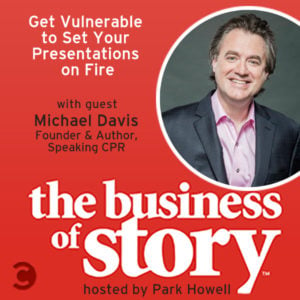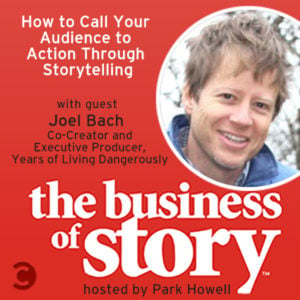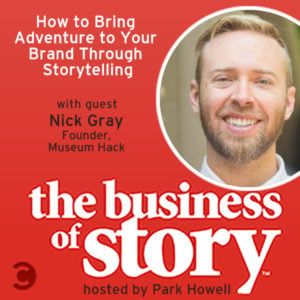Hosted By
Apple Podcast Reviews:
A lot of great information about story telling. It is hard to pick one episode, they are all good!
RisingmasterI recently came across Park Howell's excellent podcast. I love how he weaves in his personal stories with the interviews of his guests. If you are involved with sales or marketing for your business definitely check out this show.
RivetingFM
Erik Deckers, author and humor columnist, joins the Business of Story Podcast to discuss how to improve your writing skills by adding humor, understanding three-act structure, and staying simple.
 Send in the Clowns
Send in the Clowns
Do you enjoy humor? Do you make yourself laugh? Are you sick of dry, data-driven business articles? Are you funny?
Erik Deckers thinks funny is serious business. Well, seriously good for business. He is an author, humor columnist, speaker, and Founder of Pro Blog Service. His book titles include, “Branding Yourself: How to Use Social Media to Invent or Reinvent Yourself,” and “No Bullshit Social Media: The All-Business, No-Hype Guide to Social Media Marketing.” Erik was also a Jack Kerouac House Writer-in-Residence recipient this spring.
Today, Erik talks us through the basic strategy of comedic writing to prove that it can be learned, the memorable and enjoyable nature of three-act structure, and how we can absorb lessons from the masters of the past.
Erik urges us to keep it simple: “Just use the best words possible that make your language and your writing tighter and make it more interesting to read.”
In This Episode
- Why infusing your writing with humor will improve it dramatically
- How to break down comedic theory to make it accessible and useable
- Why you can absolutely can learn to be funny
- How stories are more approachable and more memorable with comedy
- Why some are hesitant to use humor in the workplace, but it is a misplaced fear
- How to absorb lessons from great fiction writers
Quotes From This Episode
“Surprise and recognition are sort of those two main elements of doing successful humor.” —@edeckers
“Write like people, write like real people.” —@edeckers
“Our goal is to make content better than everybody else’s. We don’t want to make more content than anyone else.” —@edeckers
“There actually is a formula to humor, and so you can learn it, and you can start to put it into effect.” —@edeckers
“A lot of people are afraid of doing humor in the workplace because it’s very risky. Which it is, in the hands of an amateur. But if you know what you’re doing it’s one of the safest tools you can use.” —@edeckers
“I don’t write serious things if I can help it.” —@edeckers
“The average newspaper is written at a sixth-grade reading level for a reason. It’s not because everybody is stupid, it’s because that’s where we want to process information. And your readers, even if they are college professors, still want to process information at that sixth-grade level.” —@edeckers
Resources
- Erik Deckers
- Erik Deckers on Twitter, @edeckers
- Pro Blog Service
- Kerouac House Writer-in-Residence Program
- “The Storytelling Animal: How Stories Make Us Human” by Jonathan Gottschall
- Fast Company Magazine
- hemingwayapp.com
- “The Hero’s Journey,” by Joseph Campbell
- “Your DIY Guide to Crafting and Telling Compelling Brand Stories that Sell,” by Park Howell
- BusinessofStory.com
- Park@BusinessOfStory.com

 Send in the Clowns
Send in the Clowns



